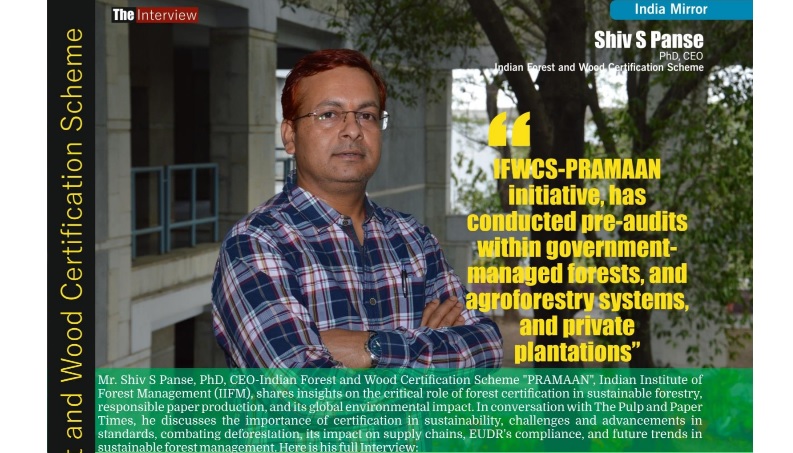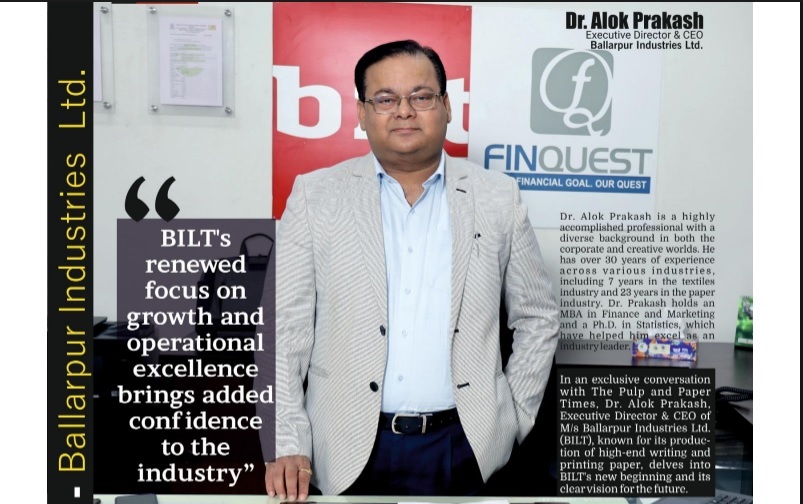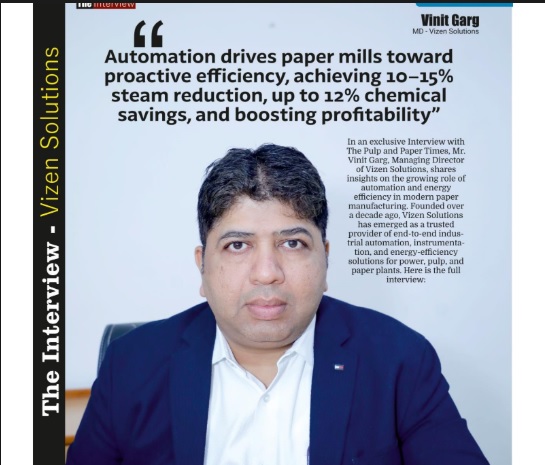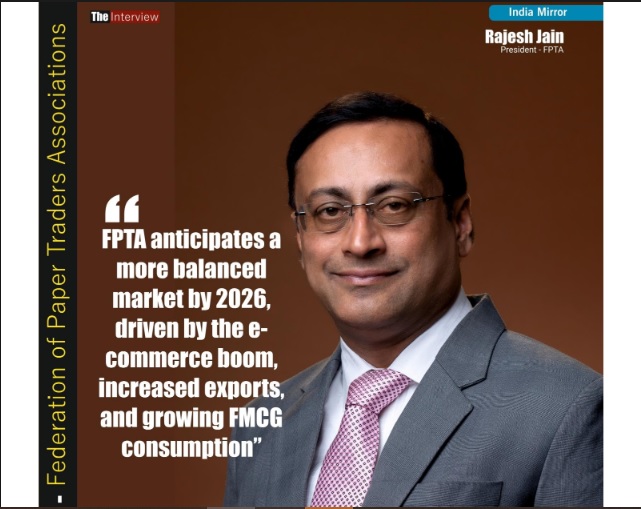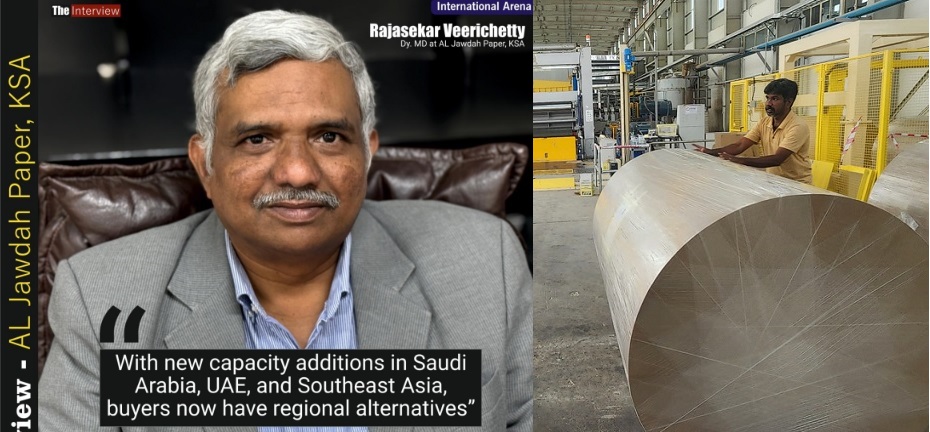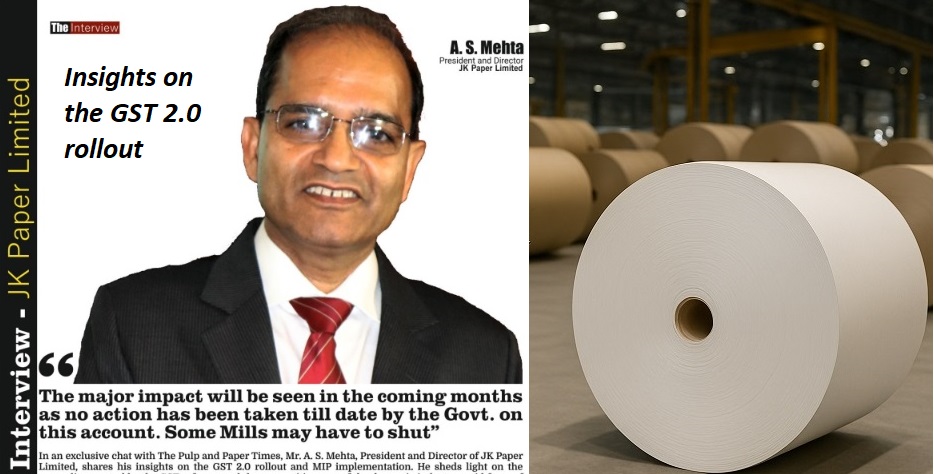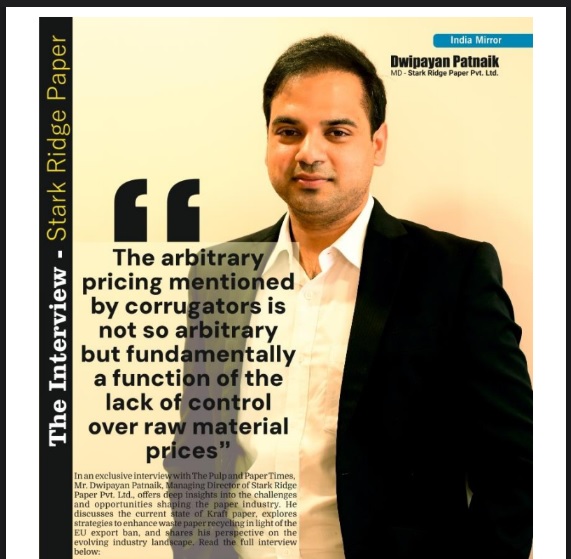“Indian paper industry would see a gradual shift towards smart manufacturing practices, aiming to reduce operational costs, and optimize quality” says Valmet's Director - India Region
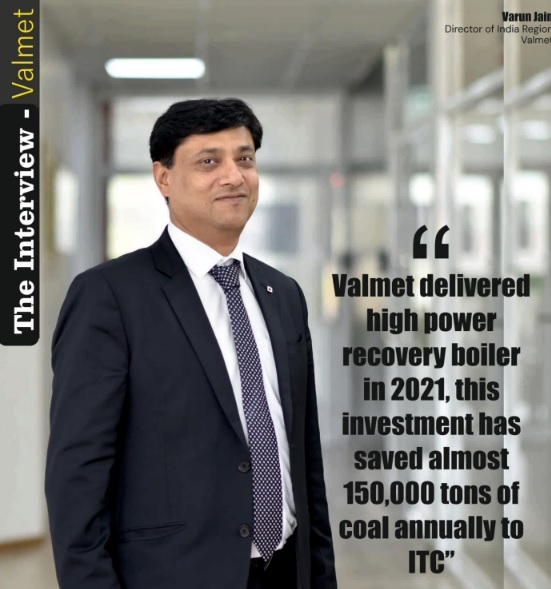
“Indian paper industry would see a gradual shift towards smart manufacturing practices, aiming to reduce operational costs, and optimize quality” says Valmet's Director - India Region
-Valmet delivered high power recovery boiler in 2021, this investment has saved almost 150,000 tons of coal annually to ITC
-Paper mills are actively working on creating packaging solutions that are both recyclable and easily decomposable
-Automation, data analytics, and digital communication tools are being integrated into their processes to optimize operations and better serve customers
-Enhancing energy efficiency throughout the paper production process is crucial for sustainability and cost-effectiveness
Recently, The Pulp and Paper Times spoke to Mr. Varun Jain, Director of the India Region at Valmet, a leading global developer and supplier of process technologies, automation, and services for various industries, particularly in energy, pulp and paper, and other process industries. Mr. Jain spoke about the various existing and future-oriented aspects of paper-making technologies, Industry 4.0, and other issues regarding the Indian paper industry. Here is his full interview.
The Pulp and Paper Times | March 2024:
Q: Please give us a small introduction to Valmet?
Valmet is a leading global developer and supplier of process technologies, automation and services for various industries, particularly in the energy, pulp and paper, and other process industries. Established in 2013 as a result of the demerger of the pulp, paper, and power businesses from Metso Corporation, Valmet has a rich history dating back over 220 years in the industry.
The company specializes in offering a wide range of products and services, including machinery, equipment, automation systems, and services for industries such as pulp, paper, energy, and beyond. Valmet focuses on sustainability, innovation, and efficiency in its offerings, aiming to help its customers improve their performance while reducing environmental impact.
Q: What is your view on Pulp and Paper Industry post-COVID pandemic? What new trends in the Product Mix of Paper Mills arising out?
The pandemic prompted a digitalization surge in the paper industry as well, with a focus on IoT, AI, and data analytics for efficiency. Global supply chain vulnerabilities led manufacturers to reinforce and adapt their supply chains. Shifting consumer behavior during the pandemic affected demand patterns, prompting companies to adjust production accordingly. The rise of remote work emphasized the importance of virtual tools for communication and collaboration, becoming integral to maintaining productivity.
In response to evolving consumer preferences and sustainability goals, paper mills are adjusting their product mix. This involves developing paper-based alternatives to replace single-use plastics and investing in eco-friendly, high-quality paper products made from recycled materials. With growing environmental awareness, there's a shift toward biodegradable and compostable packaging materials. Paper mills are actively working on creating packaging solutions that are both recyclable and easily decomposable, aiming to minimize environmental impact. To further sustainability, many mills are adopting renewable energy sources like wind, solar, or biomass and implementing energy-efficient processes to reduce their carbon footprint.
With the rise in e-commerce and personalized branding, there is a demand for specialty papers for unique packaging, labels, and design-oriented products. Paper mills are diversifying their offerings to include specialty papers that cater to specific industries and customization needs. Consumers are seeking papers with enhanced functionalities such as moisture resistance, antimicrobial coatings, or innovative finishes. Paper mills are investing in R&D to develop papers with these added features to meet the evolving needs of various industries.
The digital age has influenced paper mills to embrace digital technologies for enhanced efficiency in production, distribution, and customer service. Automation, data analytics, and digital communication tools are being integrated into their processes to optimize operations and better serve customers.
These trends reflect the evolving landscape of the paper industry, where sustainability, digitalization, and customization are becoming increasingly important factors in determining the product mix of paper mills.
Q: Indian Paper Industry has faced the heat of non-availability of recovered paper in last two years, does Valmet think that paper manufacturers should think about alternative fibers such as Agro Residue, especially rice straw? Can technology help a paper mill to run Paper machines on both fiber (Recovered and Agro)?
The scarcity of recovered paper poses challenges for the paper industry, affecting supply chains and production. Using agro residue, like rice straw, as an alternative fiber source is a potential solution. However, integrating such fibers into the existing manufacturing process might require adjustments in technology, equipment, and processes. Valmet as a technology provider, has successfully supplied the world's largest wheat straw and bagasse based fiberlines. Valmet actively explores integrating alternative fibers into papermaking by offering solutions and technology enhancements. Their approach involves technological innovation, collaboration with paper manufacturers, and advocating for sustainability in the industry.
Q: Being a leading global developer and supplier of process technologies company, what are focused areas Valmet does see in the paper industry process which need to be addressed at the preliminary level?
Enhancing energy efficiency throughout the paper production process is crucial for sustainability and cost-effectiveness. Valmet develops solutions for reducing energy consumption, optimizing heat recovery, and implementing advanced control systems to minimize waste. It also works on refining processes to ensure efficient fiber utilization and develops technologies to use alternative raw materials sustainably. It also invests in technologies that reduce emissions, water usage, and waste generation, striving for more eco-friendly production processes. Providing comprehensive support throughout the lifecycle of equipment is essential. We offer services for maintenance, upgrades, and performance optimization to ensure the long-term efficiency and reliability of paper machines.
Q: The industrial world is facing rapidly changing challenges. Our resources are finite, and we all need to do more with less. Digitalization and automation are the game changers to meet these challenges on the way to Industry 4.0. It is essential to collect, understand and use the massive amount of data created in the Industrial Internet of Things (IIoT). How does Valmet support the Industry 4.0 concept in the paper process?
Valmet has a unique offering, which covers process technology, automation and services, to customers in pulp, paper and energy industry. Our automation solutions range from single measurements to mill or plant-wide process automation systems.
Valmet Industrial Internet offering (VII) covers an extensive range of solutions and applications for our customers. We combine our process technology, automation and services expertise and advanced data analytics to empower pulp, paper and energy producers to move toward more efficient, sustainable and competitive operations.
We have advanced analyzers and measurements to collect real-time data from machines and processes, then use data discovery and analysis applications to provide insights that aid in decision-making, allowing for predictive maintenance, process optimization, energy efficiency, quality improvements and overall reduce operational cost.
We also offer remote monitoring and control systems that enable paper mills to oversee operations regardless of their location. This not only improves safety but also facilitates quicker response times to any issues that arise. Through the use of data analytics, we help paper mills predict equipment failures before they occur. This proactive approach minimizes downtime and reduces maintenance costs. We closely work with our customer through customizing solutions according to their specific needs and requirements, ensuring seamless integration of Industrial Internet into their existing systems.
Q: How does Valmet study and analyze the whole lifecycle and value chain of a client's business and provide solutions?
Valmet relies on a combination of technology knowledge, automation and service expertise, and collaborative partnership with its customers to deliver comprehensive and effective solutions that address the client's needs and add value to their business.
We begin by understanding the specific needs, challenges, and goals of our customers. We also conduct a thorough lifecycle assessment of our customers products or services. Valmet leverages its expertise in process technologies to evaluate the existing technologies and processes utilized by the client. This assessment helps identify opportunities for optimization, efficiency improvements, and cost reductions. Based on the collected data and analysis, Valmet develops tailored solutions for the client. These solutions may include recommendations for process optimization, technology upgrades, automation solutions, or even new product development to enhance efficiency, sustainability, and profitability.
We work closely with our customers to implement the proposed solutions. This involves providing the necessary equipment, implementing new processes, training personnel, and providing ongoing support to ensure the successful integration and functioning of the solutions.
Q. Where does Valmet project Paper Industry in the next decade especially the Indian Paper Industry on the parameter of digitization and automation?
Valmet has been focusing on leveraging digital solutions and automation to enhance efficiency, productivity, and sustainability in the paper industry. Indian paper industry would see a gradual shift towards smart manufacturing practices, aiming to reduce operational costs, optimize quality, and minimize environmental impact. The integration of digital solutions could enable real-time monitoring, predictive maintenance, and data-driven decision-making in Indian paper mills. These advancements could optimize various processes such as papermaking, quality control, maintenance, and resource management.
Q In India, new capacities are being set up between 500 to 1000 TPD; what is the reason behind this trend? One should understand that resource optimization and production efficiency are the keys behind mega capacities. Don’t you think that big capacity involves high risk also?
There is a growing demand for paper and paper-based products in India, prompting companies to expand their capacities to meet market needs efficiently. Larger capacities often allow for economies of scale, reducing the production cost per unit. This might be an attractive proposition for companies aiming to enhance their competitiveness and profitability. Consolidating production into larger capacities can sometimes optimize resources like energy, raw materials, and labor more effectively, leading to better efficiency. Moreover, modern paper machines may be more efficient, enabling higher output without proportional increases in resource usage or operational complexities. I would say balancing the benefits of higher capacity against potential risks involves thorough market analysis, risk assessment, and ensuring robust strategies for production optimization, resource management, and market adaptability. The producers in Europe and also Asia are already actioning through rebuild or new investment to respond to the trend.
Q. Paper mills always look for optimising water, Energy, Steam resources and efficient use of waste material. How does Valmet satisfy its client with latest technologies available?
Valmet develops and provides state-of-the-art equipment and systems designed to optimize water, energy, and steam usage. Our technologies focus on reducing resource consumption while maintaining or improving production output. It also utilizes digitalization and automation technologies to enhance overall plant efficiency. This includes advanced monitoring and control systems that optimize processes in real time, reducing energy wastage and maximizing production output. Valmet invests significantly in R&D to stay at the forefront of technological advancements. By continually innovating, we can offer our customers the most up-to-date and efficient solutions available in the industry. It also emphasizes sustainability, aiming to provide solutions that not only improve efficiency but also minimize environmental impact. We often develop technologies that comply with stringent environmental regulations while optimizing resources. And lastly our collaborative approach helps tailor solutions to meet individual requirements, ensuring maximum satisfaction.
For example, ITC limited customer reference in India, which Valmet delivered high power recovery boiler in 2021, this investment has saved almost 150,000 tons of coal annually to ITC.
Another successful customer reference from Naini Papers, with a key process technology on major fiber line project making bleached hardwood kraft (BHK) pulp, result on reducing water consumption, from targeted less than 9.5 to less than 9 m3 per ton of pulp.
Q: Valmet provides future-proof automation solutions for pulp, board, paper, tissue, energy and process industries. How does this solution increase the operational efficiency of a paper plant
Valmet's automation develops and supplies Distributed Control Systems (DCS), industrial applications, Quality Management Systems (QMS), analyzers and measurements, Industrial Internet solutions, valve solutions and automation services to pulp, paper, energy and process industries. With our comprehensive automation solution, process knowledge and service expertise, we can help mills to increase their overall operational efficiency and profitability.
For example, our Mill-Wide Optimization solution, mill production teams are equipped to make well-informed decisions that boost present and future performance by aligning the decisions across different process areas towards shared goals. Operating in real-time, Valmet Mill-Wide Optimization takes into consideration the entire mill balance and considers both the current and future states of the mill, including process area interruptions and slowdowns.
Q: Please shed some light on Valmet projects in India
Valmet has been recently awarded with a new specialty paper machine from Naini Papers and it is expected to start early 2025. This machine is first of its kind in India with a design speed of 1200 m/min and aiming to produce mainly C1S (coated one side), C2S (coated two sides) and some extend WFU (woodfree uncoated grade) with a grammage range 40-170 g/m2. From the renewable side, we are executing three projects in India comprising of BioTrac™ biomass pretreatment system for biomass to ethanol application. With this technology, waste material such as rice straw can be utilized to produce climate friendly biofuels.
We have been also selected to design and supply Flue Gas Desulfurization (FGD) for a petroleum refinery’s four boilers which are located in the western part of India. The solution will help to reduce emissions and meet the new emission norms regulated by the Ministry of Environment, Forests and Climate Change (MoEF & CC). The delivery is scheduled to be completed in the third quarter 2024, and the start-up is planned for the fourth quarter of 2024.
Web Title: “Indian paper industry would see a gradual shift towards smart manufacturing practices, aiming to reduce operational costs, and optimize quality” says Valmet's Director - India Region




 Join WhatsApp Group
Join WhatsApp Group Join Telegram Channel
Join Telegram Channel Join YouTube Channel
Join YouTube Channel Join Job Channel (View | Submit Jobs)
Join Job Channel (View | Submit Jobs) Join Buy Sell Channel (Free to Submit)
Join Buy Sell Channel (Free to Submit) Paper News Headlines Channel (Free to read)
Paper News Headlines Channel (Free to read)


